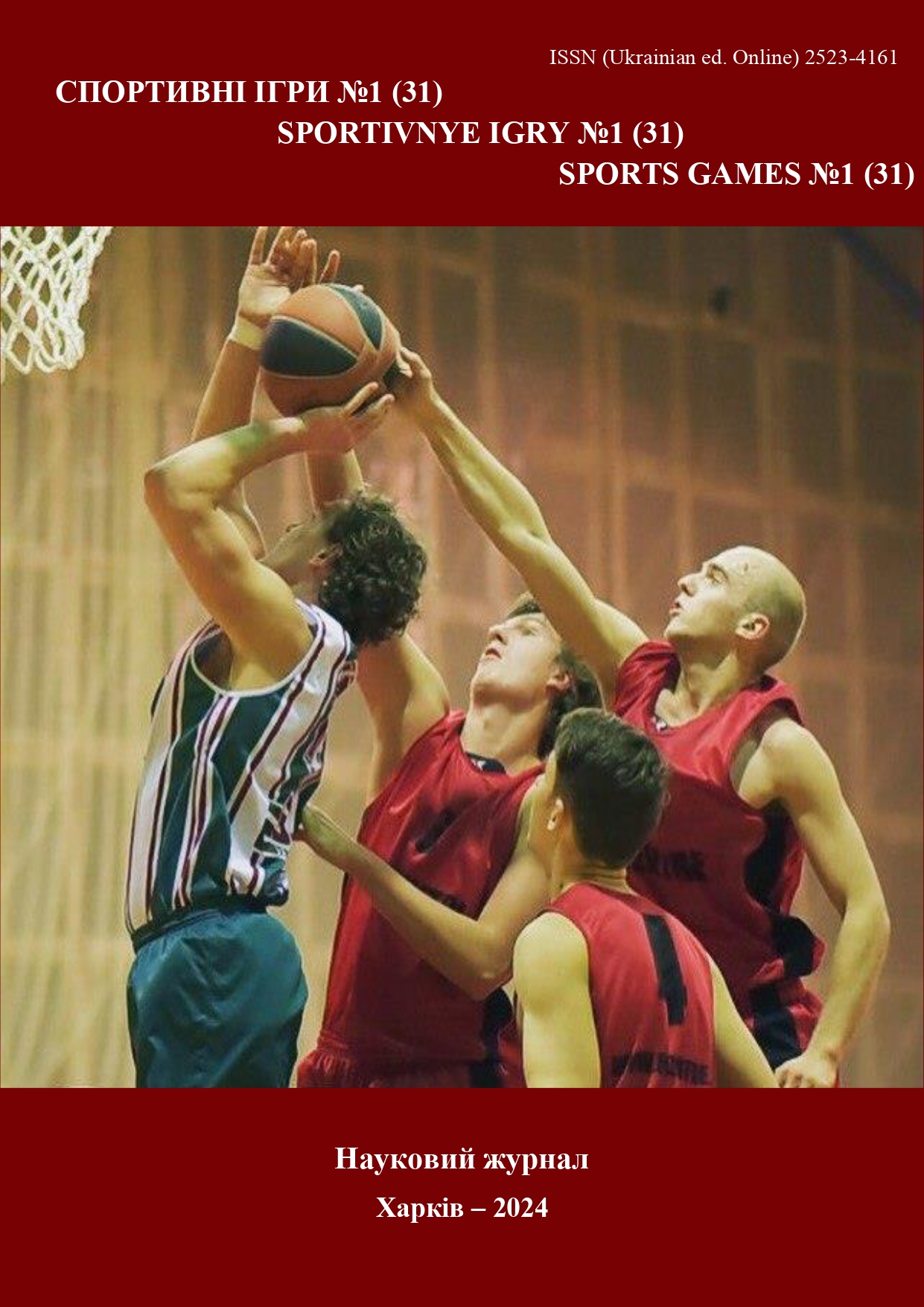Емоційне благополуччя та успішність у командних видах спорту
DOI:
https://doi.org/10.15391/si.2024-1.07Ключові слова:
емоційна компетентність, емоційний добробут, емоційність, успішність, діяльність, особистість, позитивна психологія, командні види спортуАнотація
У стрімкому та висококонкурентному сучасному світі командних видів спорту, де успішність у змаганнях пов'язана з фізичними здібностями спортсменів, їх емоційним та розумовим потенціалом, феномен емоційного благополуччя спортсменів має важливе значення. Емоційне благополуччя означає наскільки добре люди здатні приймати і керувати своїми емоціями, почуттями, переживаннями і навіть справлятися з проблемами протягом усього життя. У цій статті представлено комплексний теоретичний, психологічний аналіз взаємозв'язку та взаємовпливу між емоційним благополуччям та успішними спортивними результатами у командних видах спорту. Огляд сучасних психологічних досліджень та публікацій проблеми, що вивчається, спрямований на виявлення зв'язку між емоційною компетентністю, лідерством, спортивною успішністю та емоційним благополуччям професійних спортсменів у командних видах спорту. Цілі даного дослідження полягають у тому, щоб вивчити та розкрити взаємозв'язки та взаємовпливи між емоційним благополуччям та успішністю спортсменів у командних видах спорту. Завдання даного дослідження припускають теоретичне дослідження проблеми емоційної компетентності, лідерства та їхнього впливу на емоційне благополуччя та повсякденне функціонування спортсменів командних видів спорту. Використовуючи методи дослідження, включаючи психологічне оцінювання, бесіди, опитування та глибинні інтерв'ю, ми збираємо необхідні дані для висвітлення взаємозв'язків між емоційним благополуччям та успішністю спортсменів у командних видах спорту. Ця стаття включає сутнісні моменти дослідження, розглядає проблему, що вивчається, огляд останніх досліджень і висвітлює невирішені аспекти у сфері емоційного благополуччя спортсменів у командних видах спорту. Результати дослідження можуть використовуватися для розробки навчальних та тренінгових програм, спрямованих на підвищення емоційної компетентності спортсменів, для підвищення їх ефективності у міжособистісній та груповій взаємодії та досягненні успішності у змаганнях у командних видах спорту.
Посилання
Гоулман, Д. (2021). Емоційний інтелект у бізнесі. Як стати успішним у житті та кар’єрі. Харків: Vivat..
Кас’янова, С.Б. (2018). Особливості впливу емоційного інтелекту на особистісні ресурси подолання складних життєвих ситуацій. Вісник ОНУ імені І.І.
Мечникова, 2 (48), 49–57. https://doi.org/10.18524/2304-1609.2018.2(48).145636
Носенко, Е.Л. (2016). Емоційний інтелект як чинник досягнення життєвого успіху: монографія. Київ: Освіта України.
Чернявська, Т.П. (2022). Емоційний інтелект як ресурс конкурентоспроможності у спортивній ігровій діяльності. Спортивні ігри. 2 (24), 82-90. https://doi.org/10.15391/si.2022-2.9
Чернявська, Т.П. (2021). Самоефективність як предиктор успішності професійної діяльності. Fundamental and applied researches in practice of leading scientific schools journal homepage, 44 (2), 44-47. https://doi.org/10.18524/2707-0409.2022.1-2.286680
Akelaitis, A.V., & Malinauskas, R.K. (2018).The expression of emotional skills among individual and team sports male athletes. Medical-biological problems of physical training and sports, 22(2), 62-67. doi:10.15561/18189172.2018.0201
Baniasadi, A., & Salehian, M.H. (2021). The Effect of Psychological Well-being on Athletic Performance of Professional Athletes. Pakistan Journal of Medical & Health Sciences, 15(5), 17-20. DOI: https://doi.org/10.53350/pjmhs211551680
Bar-On, R. (1997). Emotional Intelligence Inventory (EQ-I): Technical Manual. Toronto, Canada: Multi-Health Systems.
Bradburn, N. (1969). The Structure of Psychological Well-Being. Chicago: Aldine Pub. Co.
Cavallo, K., & Brienza, D. (2006). Emotional competence and leadership excellence at Johnson & Johnson: The emotional intelligence and leadership study. Europe’s Journal of Psychology, 2 (1), 286-294.
Curry, H.C. (2003). A study of the relationship between emotional intelligence and work performance. Strayer University.
Ekman, P. (1993). Facial expression and emotion. American Psychologist, 48 (4), 384-392.
Diener, E. (1984). Subjective Well-being. Psychological Bulletin, 95, 542–575.
Diener, E., & Lucas, E. (2000). Subjective Emotional Well-Being. Handbook of Emotions. New York: Guilford.
Fredrickson, B.L., & Joiner, T. (2018). Reflections on positive emotions and upward spirals. Perspect. Psychol, 13, 194–199.
Goleman, D. (2001). An EI-based theory of performance. The emotionally intelligent workplace: How to select for, measure, and improve emotional intelligence in individuals, groups, and organizations, 1(1), 27-44.
Kahneman, D., Diener, E., & Schwarz, N. (Eds.). (1999). Well-being: Foundations of hedonic psychology. Russell Sage Foundation.
Laborde, S., Dosseville, F., Guillén, F., & Chávez, E. (2014). Validity of the trait emotional intelligence questionnaire in sports and its links with performance satisfaction. Psychology of Sport and Exercise, 15, 481–490.
Lavega, P., Alonso, J.I., Etxebeste, J., Lagardera, F., & March, J. (2014). Relationship between traditional games and the intensity of emotions experienced by participants. Research Quarterly for Exercise and Sport, 85(4), 457-467.
Lavega, P., Sáez-de-Ocáriz, U., Lagardera, F., March-Llanes, J., & Puig, N. (2017). Emotional experience in individual and cooperative traditional games. A gender perspective. Anales De Psicología/Annals of Psychology, 33(3), 538-547.
Lazarus, R.S. (2000). How emotions influence performance in competitive sports. The Sport Psychologist, 14, 229-252.
Mann, D.T.Y., Williams, A.M., Ward, P., & Janelle, C. (2007). Perceptual-Cognitive Expertise in Sport: A Meta-Analysis. Journal of Sport & Exercise Psychology, 29 (4), 457–478.
McCarthy, P.J, Jones, M., & Carter, D.C. (2008). Understanding enjoyment in youth sport: A developmental perspective. Psychology of Sport and Exercise, 9(2), 142–156.
Mayer, J.D., Salovey, P., & Caruso, D. (2004). Emotional intelligence: Theory, Findings, and Implications. Psychological Inquiry, 15 (3),197–215.
Muñoz, V., Lavega, P., Serna, J., Sáez, de Ocáriz U., & March, J. (2017). Mood states when playing alone or in cooperation: Two unequal motor and affective experiences. Revista Anales de Psicología, 33(1), 196-203. http://dx.doi.org/10.6018/analesps.33.1.233301
Ryff, C., & Keyes, C. (1995). The Structure of Psychological Well-Being Revisited. Journal of Personality and Social Psychology, 69 (4), 719-727.
Singh, K.R, & Mili, A. (2015). Study of Emotional Intelligence among Players of Individual, Dual and Team Sports. International Journal of Science and Research, 12(5), 1101–1106.
Soflu, G.H, Esfahani, N., & Assadi, H. (2011). The Comparison of emotional intelligence and psychological skills and their relationship with experience among individual and Team athletes in superior league. Social and Behavioral Sciences, 30, 2394–2400.
Sternberg, R.J., & Wagner, R.K. (Eds.). (1986). Practical intelligence: Nature and origins of competence in the everyday world. New York: Cambridge University Press.
Strieker, L.J., & Rock, D.A. (1990). Interpersonal competence, social intelligence, and general ability. Personality and Individual Differences, 11, 833-839.













